




The Ayn Rand Institute fosters a growing awareness, understanding, and acceptance of Ayn Rand’s philosophy, Objectivism, in order to create a culture whose guiding principles are reason, rational self-interest, individualism, and laissez-faire capitalism—a culture in which individuals are free to pursue their own happiness.

“The present state of the world is not proof of philosophy’s impotence, but the proof of philosophy’s power. It is philosophy that has brought men to this state—it is only philosophy that can lead them out.”
—Ayn Rand, “For the New Intellectual,” For the New Intellectual

In the wake of the fallout from the atrocious attacks in the Middle East, we saw universities across the country wallow in their tangle of mixed and bad premises as many of their donors pulled their funding. We saw the value of a university education called into question and the prestige of universities’ staff publicly stripped. People began searching for alternatives in earnest.
In 2024 our work at the Ayn Rand Institute not only continued but gained steam with renewed force and a dedicated strategy. At ARI we operate with strategic focus within a culture of excellence—and a powerful sense of urgency. We’re building the engine that will change the trajectory of human civilization. We continue to invest in ARU and in the training of new intellectuals: this is the heavy lifting of cultural change. Furthermore, our newly launched ARU honors program started the year with three students who will join more than twenty fellows who already participate in ARI’s Graduate Center for Intellectual Development. The honors students each undertake long-range intellectual projects with supervision and guidance from ARU faculty. One student is working to create chapter-by-chapter, thoughtful engagement with Atlas Shrugged that will be made freely available online, while another is preparing educational materials around the period of Reconstruction in the United States, an important topic littered with package deals and mis-integrations. Through the Conceptual Education Program and the Conceptual Education Fellowship, we’re promoting the “one in the many” (you can read more on page 49). And we’ve updated

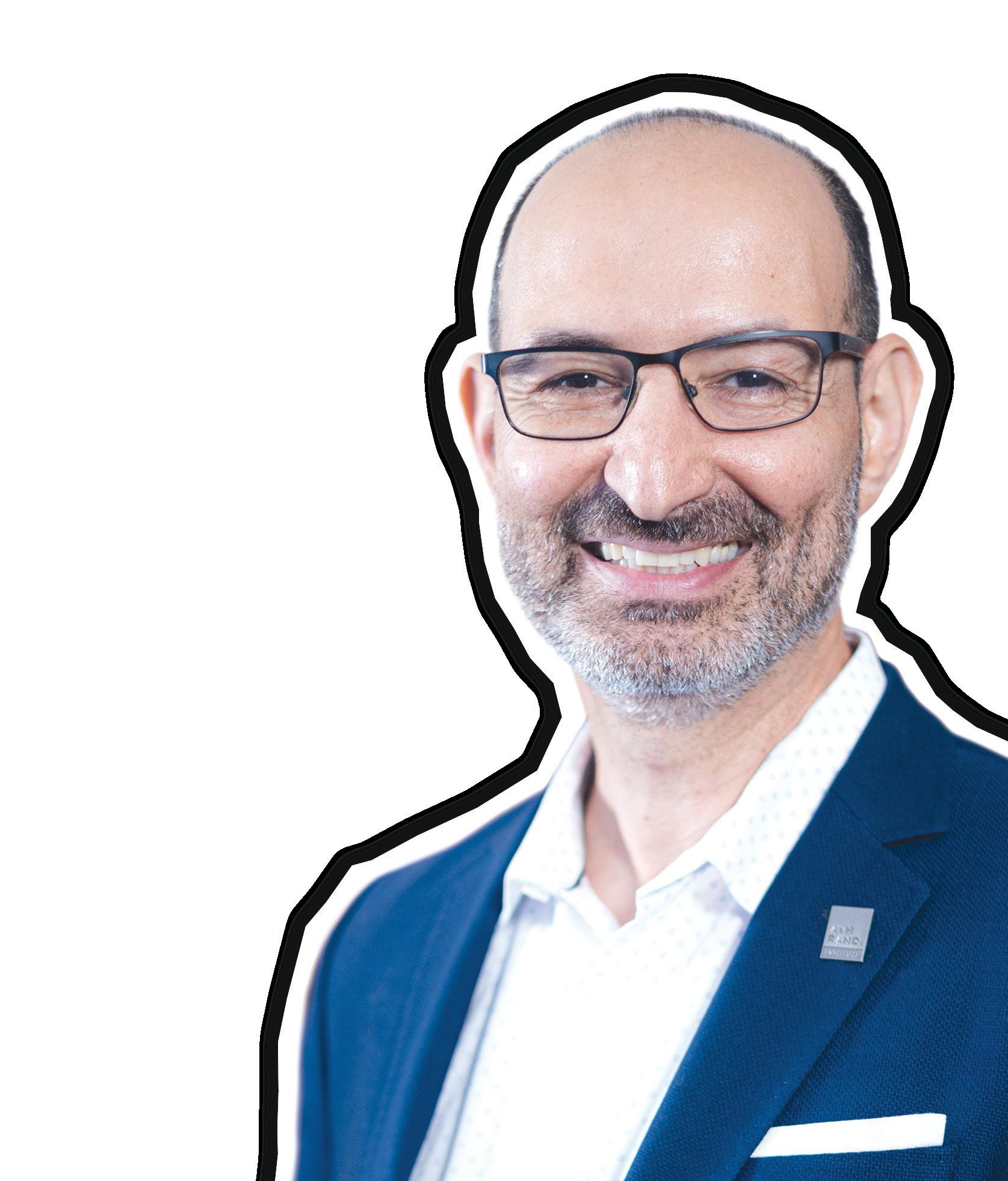
our online, free-access educational offerings on the Ayn Rand Institute app—the source for talks and lectures by Ayn Rand, Leonard Peikoff, and other Objectivists.
The Ayn Rand Archives published two “new” original interviews with Ayn Rand this year. ARI acquired the intellectual property rights and has made the interviews freely available online (more information on page 45). Our archival work helps introduce people to Ayn Rand directly—through her own words, images, and artifacts.

Our commitment to building visibility for Ayn Rand now extends to Austin, Texas, where we are building the Ayn Rand Center—a physical space to honor Rand’s works as well as house her possessions and related materials. The building will act as an intellectual hub, a campus, a museum and archives, a headquarters for ARI, and a symbol for the culture. The creation of this building is a once-in-a-lifetime opportunity; turn to page 7 and find out more.

Through our commitment to excellence in all areas, we’ve achieved a 100% Charity Navigator rating—we honor every donation and treat every piece of support with respect.
Thank you for partnering with us to create meaningful, lasting change.
Sincerely,
Tal Tsfany Chief Executive Officer
Onkar Ghate Chief Philosophy Officer
The 2024 numbers are in . . .
Our educational program is bigger than ever.

21 ARU courses
24 ARU Graduate Center students
We celebrated our largest graduating class ever.
21 Students graduated from our two-year program in Philosophy and Objectivism
22,452 ARU course hours (2023-2024)
200 ARU students



For years, ARI has had an audacious goal: to erect a building that would serve as a testament to the legacy of Ayn Rand and expand her influence in the world. To create a building worthy of the author of The Fountainhead and Atlas Shrugged, however, would cost tens of millions of dollars. It was a dream that seemed out of reach.
But thanks to a passionate team of supporters (see the interview on page 11) and the extraordinary generosity of our donors, ARI’s chairman of the board, Yaron Brook, and ARI’s president and CEO, Tal Tsfany, were able to announce at this year’s OCON that we will soon be breaking ground on the Ayn Rand Center with the goal of opening its doors in 2028.

Recognizing that every successful cultural movement is born from a vibrant community of thinkers, students, activists, and patrons, the Ayn Rand Center will help advance Objectivism by becoming a center of learning, debate, outreach, culture, and influence. This state-of-the-art building, minutes from the University of Texas at Austin, will house a museum
and archives, the ARU campus, an intellectual hub, ARI’s headquarters— and it will stand as a symbol celebrating Ayn Rand’s achievements as an artist and thinker.
“The Ayn Rand Center will be a center of gravity for anyone interested in learning about Rand’s work, ideas, and life,” Tal said. “It will include interactive



experiences introducing visitors to the power of Rand’s novels, nonfiction works, and heroic life story. It will serve as a physical and a spiritual beacon of light to the culture.”
The project is still in its early planning stages, but we are pleased to share early design concepts. “This is one of the most important projects ARI has
the most exciting. We are partnering with top experts to ensure that every element—from the design to the museum experience—is world class and reflects our uncompromising dedication to Ayn Rand’s ideas and ideals.”


This summer at OCON 2024 (our annual summer conference), Yaron Brook, ARI’s chairman of the board, and Tal Tsfany, ARI’s president and CEO, made an announcement whose energy rippled through the conference room, causing gasps, cries of excitement, tears, and applause: ARI is moving forward with plans to build a world-class building that will house the Ayn Rand Institute headquarters and the Ayn Rand Archives and Experience, and act as an intellectual hub and physical location for the educational programs of ARU. The building will be built in Austin, Texas, with a projected opening in 2028.
I sat down with two prime movers in this historic project who are uniquely contributing to turning this dream into reality: David Strosberg, real estate developer and architect, and Tim Blum, real estate developer and former ARI board member.
How did you come to be involved with the Ayn Rand Center project?
David Strosberg: My first awareness of the concept for the Ayn Rand Center was through my friend Tim Blum. He mentioned to me that Jim Brown [former CEO of ARI] had been talking about creating a physical presence, more than an office, a place for Objectivists to gather. I’m a real estate developer and an architect. Creating buildings is what I do. So when he told me about it, I said, “Well, that’s great. What are the parameters?”
Tim Blum: Around 2019, when I was on the board of ARI, Jim Brown raised the idea of formally putting together a committee to find a site to build a museum and archives—and that was something that really excited me. I am in the real estate business, so I took the baton and told Jim and Tal and Yaron that I would spearhead the initial site selection. Then I enlisted David—he was very enthusiastic.
And that brings us to today. David is spearheading much of the design. He’s an architect by trade in addition

to being a general contractor and a developer. He is bringing a valuable variety of skills to the table. ARI—all of us, really—are significantly benefiting from his involvement.
How did you hear about Ayn Rand?
DS: I’m an architect. So I started reading The Fountainhead because of the subject. My interest grew from there, reading all of her novels and some of her nonfiction work. I went to graduate school at Columbia University in New York, and I was there when Ayn Rand died in 1982. I was one of the people standing in line outside her funeral, the reception that they had. And so, although I never had a chance to meet her personally, I did pay my last respects. Ayn Rand provided a philosophical basis to the ideas that I had regarding free markets and individual rights. She


created a philosophy that provides a basis for how I try to operate my business and conduct my life.
TB: I came upon Ayn Rand when I was roughly 30 years old and through several unfortunate events in my life I had to reevaluate many of the principles that I had learned in my upbringing. At that time, coincidentally, a friend of mine gave me The Fountainhead. I was in the real estate business and because of the architectural theme, he thought the book would be interesting to me. At first, I picked it up and I read the first few chapters and I really didn’t care for Roark at all. I put it down. Maybe six months later, additional turmoil in my life caused me to pick it up again for some reason. Then I started reading it with a more open mind. And as I read it and started to understand how Roark comported himself, what his fundamental modus operandi was,
it was very intriguing. It was very contrary to what I had been brought up with. And as I read, it really awakened some inner angst that I had had. So I kept reading, I kept becoming more interested. I started to really just fall in love with the book, to fall in love with the characters, and, of course, Roark.
DS: I’m hoping this project becomes an international gathering spot for people who are fans of Ayn Rand and Objectivism. I think many of us who are Objectivists can feel lonely at times. We have ideas that are different from almost everyone we come in contact with. I think that a physical place could result in a lot of interesting discussions and generate ideas and plans that I can’t even fathom right now.

TB: That’s an interesting question. For me, it’s actually evolved. The original idea was to have physical representation and an area where Ayn Rand’s intellectual property and artifacts could be stored. It was going to be a museum. But that’s evolved, and what people get excited about even more is educational and interactive environments that inspire people, that cause people to want to learn and investigate.
Tal is just fantastic in terms of bringing the whole thing together with one clear vision. And so my hope has evolved from solely a museum and archives to more of a campus environment. It’s certainly going to house the museum and archives, but there’s going to be more emphasis on education and classes, courses, and the ability to have debates within the cafe, for example. And if the world comes crashing down, if we can hold out a flame and be the beacon of ideas, my hope is that we will be that burning ember.
We recently heard from one of our essay contest participants, Jaida, who told us: “Atlas Shrugged is an absolutely fascinating book, and I’m so glad I decided to read it. I found Dagny and Hank’s perseverance in spite of looters inspiring, but it is their relationships with their family that personally impacted me. . . . Hank does not have to be and should not be his brother’s keeper. All people have over you is your guilt; it’s their only weapon, and once you realize that, you disarm them. It’s such a freeing notion. I have read a great deal about conflict theory and Marxist literary theory for other classes, and Atlas Shrugged has helped reassure me that the concept of truth is not dead.” [Emphasis ours.]
This is the unique impact our donors have on thousands of essay contest participants every year.
Please consider signing up for a monthly donation to help us reach more ambitious and intellectually curious minds like Jaida’s each and every month. Monthly donors also help ARI manage its cash flow effectively, and those who contribute $25 or more per month enjoy valuable perks like our Ayn Rand Today magazine, invitations to our popular donor Roundtables, and other benefits.

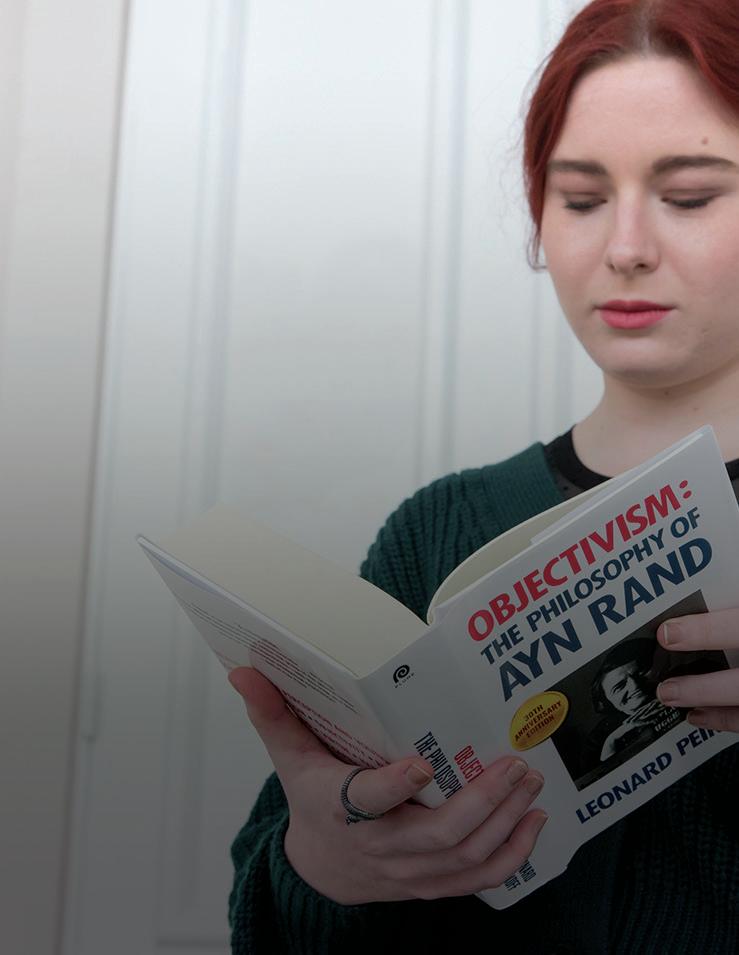
“ “. . . these skills have improved the very way I experience life itself.”

At ARI our mission is bold and long term: to replace mysticism with reason, self-sacrifice with rational selfinterest, and statism with capitalism. Our mission is accomplished through educating one mind at a time in Ayn Rand’s ideas. But what does that look like?
According to Dr. Onkar Ghate, our chief philosophy officer: “Learning Objectivism is demanding; it’s a new and radical philosophy, and you must be willing to put in the work to rethink ideas down to their fundamentals in order to understand it. This is especially true at ARU because we are loyal to what Ayn Rand’s philosophy actually is. Students must be ready to put their thoughts down on paper and to edit and rework their writing until they get the issue right. They must be prepared to revisit things they thought were good enough at first.” At ARU we provide just this kind of training. And you can take part in it.
As a supporter of the Institute, you know that ARI offers educational courses for aspiring intellectuals, typically students 35 and younger who are pursuing an intellectual career or seeking intellectual backing to complement their professional training in a field like nuclear engineering or biotechnology. But did you know that these courses are not just available to students? Anyone can take part in ARU courses as an auditor.
Our typical students attend classes live and complete graded assignments designed to help them understand, implement, and communicate Objectivism. Many of these students are like Ben Garson, a data scientist in the UK, who told us he’s benefited immensely from his studies at ARU. As he said: “To say that I’ve learnt a lot from the past two years at ARU would be an understatement of epic proportions. . . . There can’t be any doubt: the way I view and approach the world has changed substantially for the better since attending ARU.”
The fruits of studying with ARU are readily apparent. With an alumni list that includes best-selling authors, think tank founders, and successful entrepreneurs, ARU offers unparalleled Objectivist training. And yet only a select number of students are admitted to study with us each year.
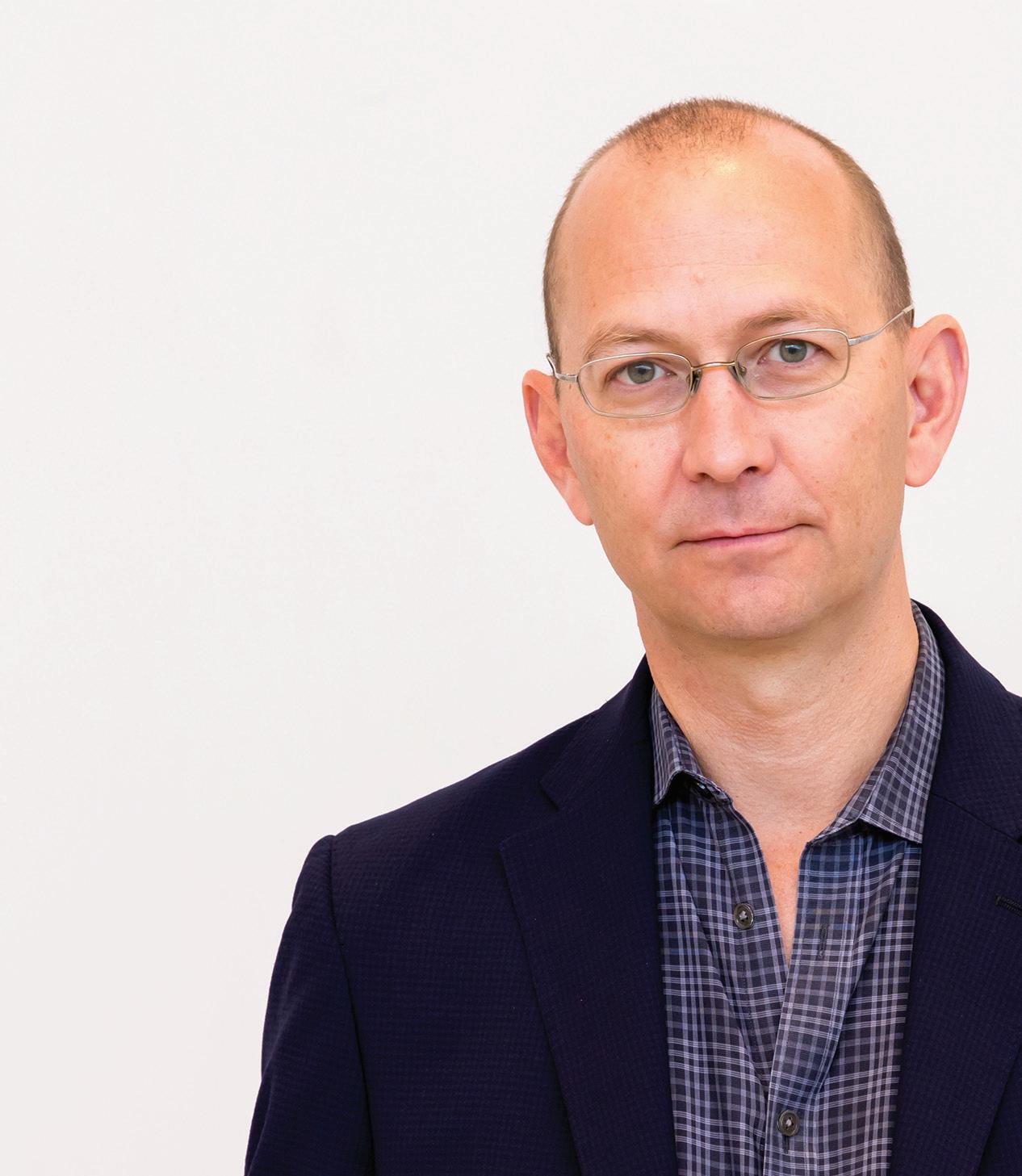
Unlike our graded program, however, auditing is open to anyone who signs up on our website: there is no application process. Most auditors’ purpose for signing up is selfenrichment and exploration. As an auditor you can attend all the live classes and you’ll retain access to recorded lessons. You can pose questions to instructors during class and also attend their office hours to discuss the lectures or assignments. Furthermore, you may complete any assignments you want to benefit from. (Auditor assignments are not mandatory or graded.)
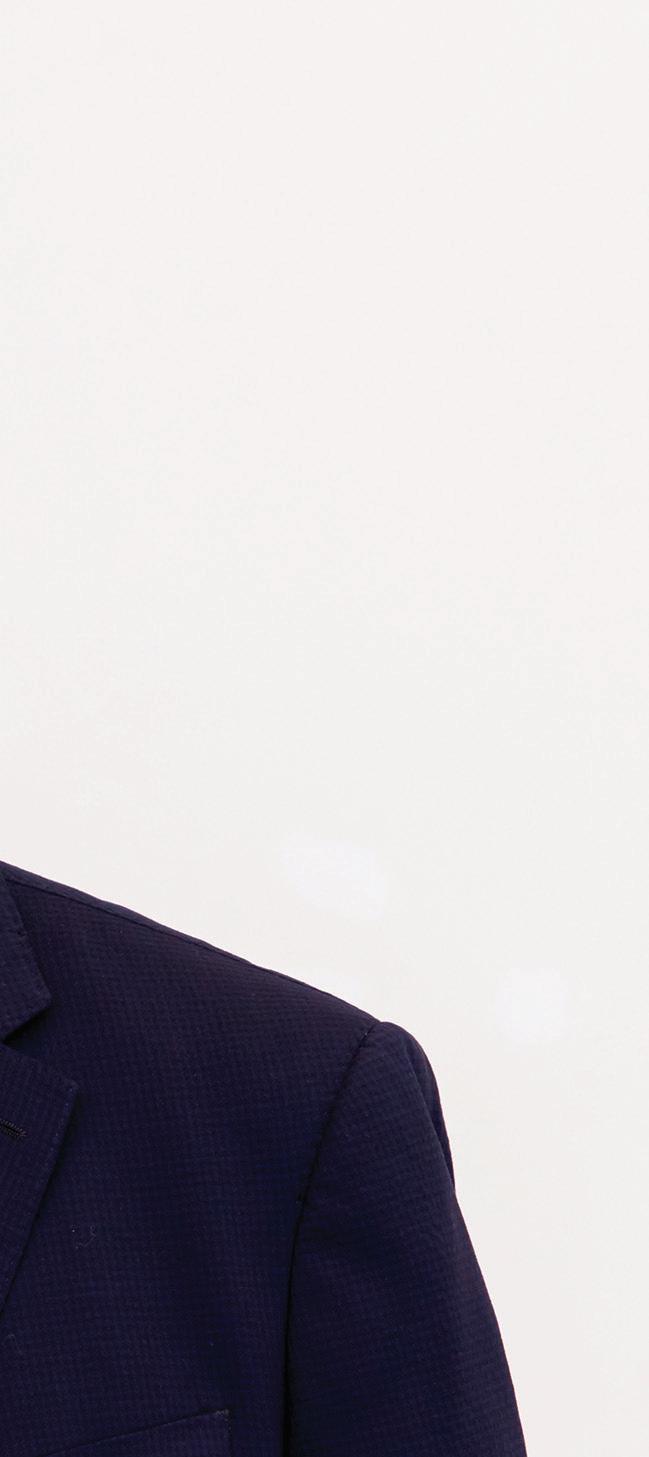

Even for long-time Objectivists who have listened to and read all of Ayn Rand’s body of work, auditing ARU offers you content you cannot find anywhere else. As auditor and long-time ARI supporter Gad Engler told ARI, “The quality of the courses is very high and so is my interest in them.” Attending classes live and receiving insightful feedback in the moment from one of our instructors can greatly accelerate your learning and knowledge of Objectivism.
The integrations you can make under our expert instructors’ guidance can also add meaningfully to your life. Vadim,
a first-time auditor, told me, “I absolutely loved the ARU auditing experience!” Praising the interactive nature of classes like Shoshana Milgram’s class on Victor Hugo’s The Man Who Laughs and Philosophy, Work, and Business, taught by Tal Tsfany and Don Watkins, Vadim said: “Overall, I like the structure of ARU courses in that it is an active participation process rather than passive listening. The assignments are openended questions that help students actually think aloud about what they actually learned or didn’t learn.” Like Vadim, as an auditor at ARU you can discover fascinating content that will help you improve as a thinker and valuer.

When you’re logged on for classes, get ready to be inspired by other students. You’ll get to meet ARU’s scholarship students and witness their enthusiasm and hope for the future—a part of what you’re making possible by participating as an auditor.
You may meet someone like Iyar Raichel, a 29-year-old Israeli who has served as a captain in the Israeli army and worked in the Israeli parliament as a legislative assistant. He told us: “The education
I’ve received at ARU has been truly transformative. The deep dive into Objectivism has not only enhanced my understanding of the philosophy but has also had a profound impact on my personal life.” He especially enjoyed being taught by Harry Binswanger. “The courses in epistemology and ethics have been particularly enlightening, helping me truly live life with greater confidence, clarity, and purpose. Dr. Binswanger’s teachings have reshaped my approach to thinking; these skills have improved the very way I experience life itself,” he said.
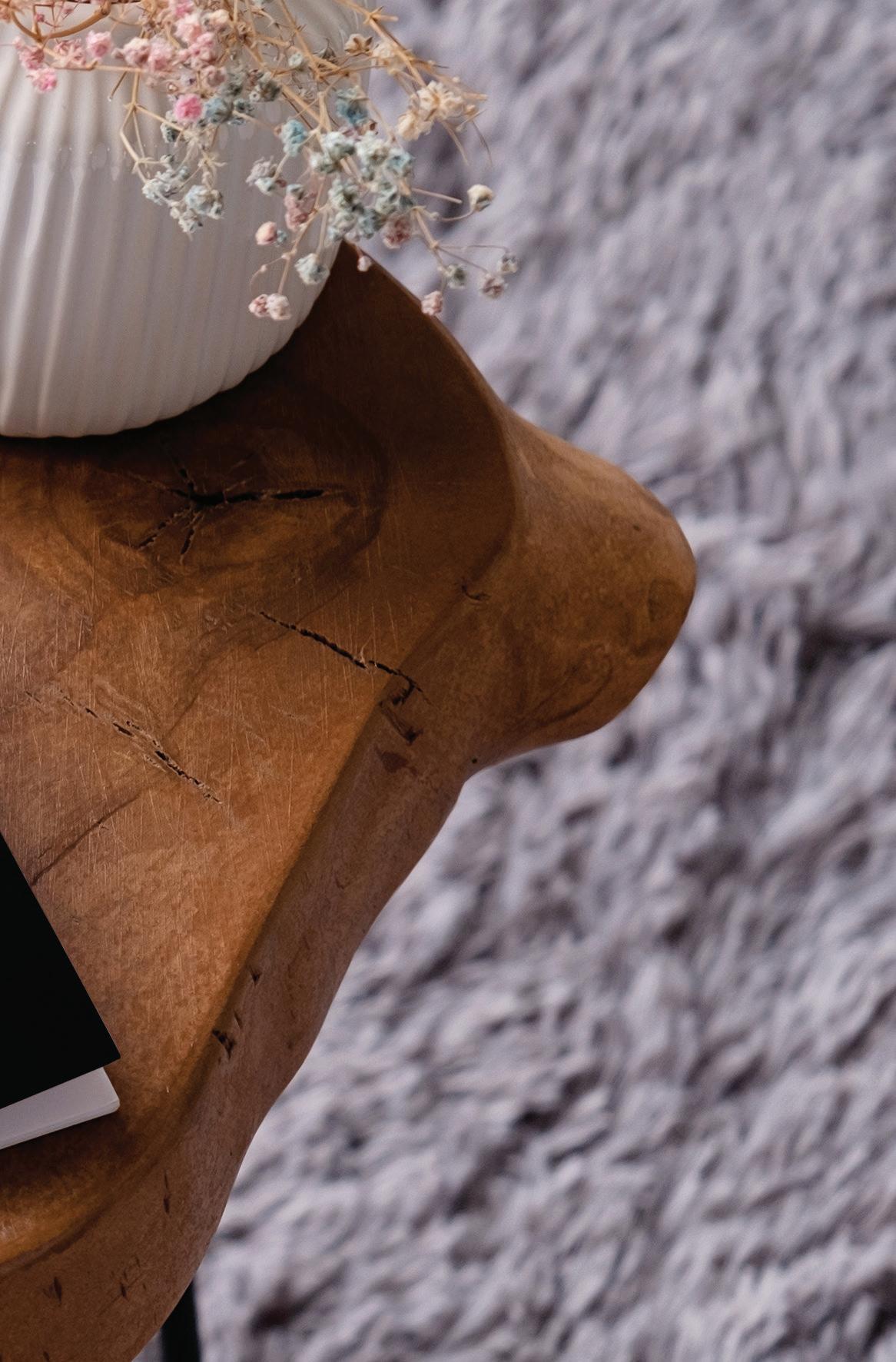
If you’ve watched Ayn Rand in interviews on television when they originally aired or on YouTube today, you’ve seen her identify the fundamental issues and express her views with confidence in the face of opposition. Through learning at ARU, you can examine your premises and solidify your confidence in your thinking.
Iyar went on to say: “This education has been invaluable in my current role as a founding member of a pro-Israeli (and pro-reason and freedom) NGO
in California, where I’m able to apply these principles directly to real-world affairs. The Western world is facing a serious risk due to the prevalence of destructive ideas. I am committed to using the knowledge and skills I’ve gained to combat the looters, the brutes, and their sanctioners, and work towards a world of heroes.”
Auditing ARU is a special value proposition to support the Ayn Rand Institute and gain immense, personal value in return. This unique educational experience further equips each of us to communicate more precisely and to share our ideas in more meaningful ways—further aiding ARI in our mission.
The ARU course catalog for the 2024–25 school year includes more than 20 course offerings. Course titles include Objectivism through Ayn Rand’s Fiction; Philosophy, Work, and Business; Marx and Communism; Introduction to Writing; and Objectivist Logic. To see the complete course catalog, please visit aru.aynrand.org.







Ben Bayer, PhD in philosophy, focuses his writing on the application of philosophy to contemporary cultural and political controversies.
Harry Binswanger, PhD in philosophy, was an associate of Ayn Rand’s and is the editor of The Ayn Rand Lexicon and co-editor of the revised edition of Ayn Rand’s Introduction to Objectivist Epistemology
Yaron Brook, PhD, chairman of the ARI board, is the host of The Yaron Brook Show and a bestselling author.
Onkar Ghate holds a doctorate in philosophy and is chief philosophy officer, senior fellow, and a board member of the Institute.
Nicolas Krusek is a musician, conductor, speaker, and music educator who earned his master’s degree in historical musicology at UBC.
Tristan de Liège, PhD, researches primarily on productive work and its relationship to wellbeing, Aristotle’s ethics, and virtue ethics.
Keith Lockitch, PhD in physics, is ARI’s vice president of education and a senior fellow.



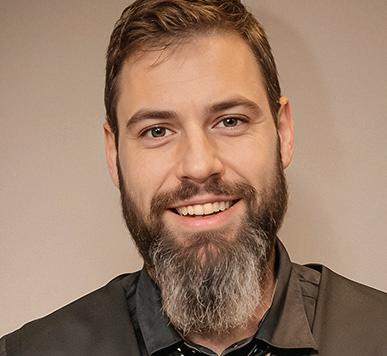


Mike Mazza, PhD in philosophy, specializes in philosophy of science with a special interest in causality.
Shoshana Milgram, associate professor of English at Virginia Tech, specializes in narrative fiction and film.
Aaron Smith, PhD in philosophy, is an instructor and fellow at the Institute where he teaches and designs educational content.
Nikos Sotirakopoulos, PhD in political sociology, is a visiting fellow at the Institute with over a decade of experience in university instruction.
Tal Tsfany was an entrepreneur, investor, and executive in the software industry and is now president and CEO of the Institute.
Don Watkins is vice president of fundraising and marketing at the Institute and is a bestselling author.
The better you understand Ayn Rand’s ideas, the more effectively you can live and advocate them. That’s why we created ARU: to provide the next generation with the world’s best training in Rand’s ideas, taught by the world’s best experts on Objectivism.
But did you know that you can take advantage of our program through auditing? ARU auditing enables you to:
• enrich your understanding of Objectivism (no matter how much you already know);
• immerse yourself in Objectivism on a weekly basis, adding intellectual value to your life;
• attend all live classes and gain access to recorded lessons; and
• meet the promising young students who take ideas seriously and will likely spearhead the Objectivist movement in the future.
One of the most valuable features of ARU is the ability to receive real-time feedback on questions and/or confusions in our live classes or during office hours. This service is unmatched, and can help you gain the confidence to communicate Objectivism more effectively (on top of courses dedicated to this purpose like Introduction to Writing).
In our present culture, the ARU experience is a different experience. The quality of our courses, teachers, and students will infuse your soul with positivity about what the future holds.
Come join our elite program whose mission it is to make reason, rational self-interest, and capitalism the dominant forces of tomorrow.
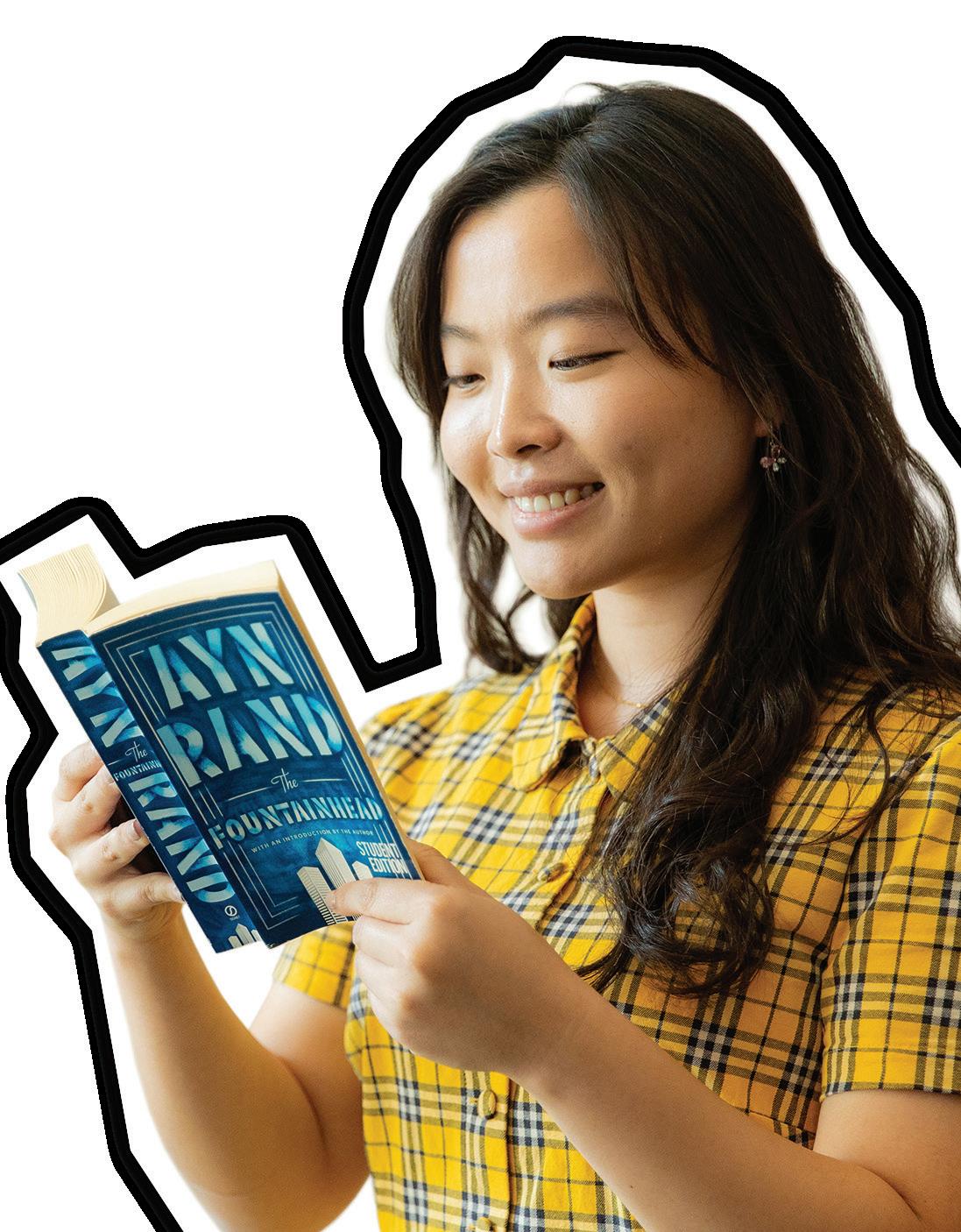

Part 2 of 2
BY AYN RAND

In 1960, during a television appearance on The Mike Wallace Interview, Ayn Rand made favorable comments about Senator Barry Goldwater, who ended up running for president on the Republican ticket in 1964. Referring to him as “the one bright hope on the political scene today,” Rand said that Goldwater had the potential to become a beacon for American conservatives by taking a “clear-cut, unequivocal stand” in favor of capitalism and freedom. She especially liked his foreign policy, with its proud assertion of American self-interest and self-esteem, and she recommended that her readers vote for him. But Goldwater was defeated in a landslide, and Rand issued a sobering assessment of America’s political culture. This essay’s title, “It Is Earlier than You Think,” perfectly encapsulates a key observation: freedom cannot prevail in practical politics until the way is paved by a cultural movement that makes the case for capitalism on moral-intellectual grounds. Sixty years later, Rand’s philosophic analysis has enduring relevance for thinking about America’s culture. We are pleased to present her essay (published originally in the December 1964 issue of The Objectivist Newsletter) in two parts, the first of which appeared in the previous issue of Ayn Rand Today If you’d like to read part one, you can request a copy of the Fall Issue of Ayn Rand Today by emailing donorservices@aynrand.org.

“Conservatism” is a loose term, embracing many different groups; it cannot be said that Sen. Goldwater represented any one of them. But what he did represent was their common denominator: a folksy, “cracker-barrel,” mass-oriented kind of anti-intellectual reliance on faith (“the heart”) and on “tradition.” The question, of course, is: what tradition?
And since a “conservative,” in the original meaning of the word, is one who seeks to preserve the status quo, the question is: what status quo?
The status quo of today is welfare statism, of a semi-socialist, semi-fascist variety. So is the explicit tradition of the past thirty years (and the implicit one of over a century).
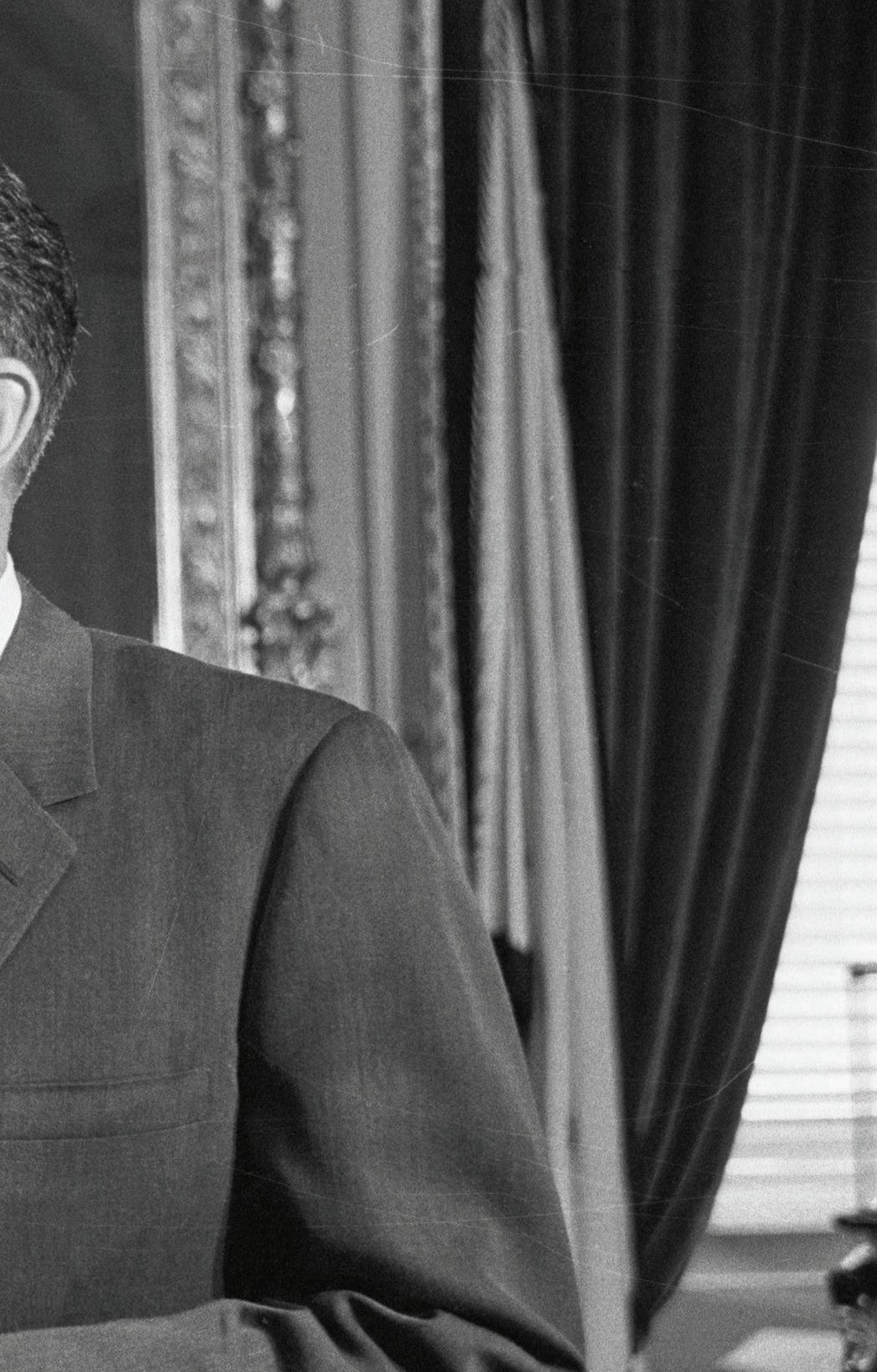
Granting the philosophical chaos of our age, was it possible to conduct a better campaign in purely political terms, and did we have a right to expect it?
“President Johnson,” said an article in The N.Y. Times of October 11, “is the true conservative in this campaign—not perhaps in the political sense in which the term has come to be used in this country but in the older and deeper sense that he is the safe candidate, the proponent of the established approach to political problems, the guardian and the champion of the vital center.”
The principles of a free society are so thoroughly forgotten today that an advocate of capitalism cannot be a “conservative.” He has to challenge the fundamental premises of our age; he has to be a rebel, a radical innovator. Paradoxically enough, that is what Sen. Goldwater was taken for; he was regarded—and feared—as the new, the unfamiliar, the unknown. This appraisal was demanded by the inner logic of events, of his position in today’s context. But an innovator has to make his principles and policies rigorously clear; he cannot speak in and count on bromides.
Granting the philosophical chaos of our age, was it possible to conduct a better campaign in purely political terms, and did we have a right to expect it? It was and we did. A brief
glimpse of it, the best of the campaign, was a speech by Ronald Reagan, televised much too late—in the last week before the election.
All of the candidate’s speeches should have been on a level equal to Mr. Reagan’s. But none of them approached it.
It is impossible to tell whether a campaign conducted on that level would have won. I think it might have. But what one can say with certainty is that it would not have ended in so devastating a defeat.
As it stands, the most grotesque, irrational and disgraceful consequence of the campaign is the fact that the only section of the country left in the position of an alleged champion of freedom, capitalism and individual rights
Since no fundamental issues were discussed, since so many contradictions were offered by both sides, it is impossible to tell what the voters thought they were choosing.
is the agrarian, feudal, racist South. The Southerners, undoubtedly, were voting on the basis of “tradition”; but it was hardly a tradition of pro-capitalism. This, perhaps, is the clearest indication of the extent to which Sen. Goldwater had failed to present his case.
It is difficult to draw any conclusions about the ideological state of the


country at large. Since no fundamental issues were discussed, since so many contradictions were offered by both sides, it is impossible to tell what the voters thought they were choosing. There were, apparently, as many different motives as there are pressuregroups. It is foolish to imagine—as some Republicans are doing—that all those who voted for Sen. Goldwater were
staunch supporters of freedom and capitalism. They obviously were not. It is just as foolish to believe that all those who voted for President Johnson were confirmed statists. But whether wittingly or unwittingly, whether through ignorance, cowardice, confusion or evasion, whether by default or by fully conscious intention, it was capitalism that the voters rejected.
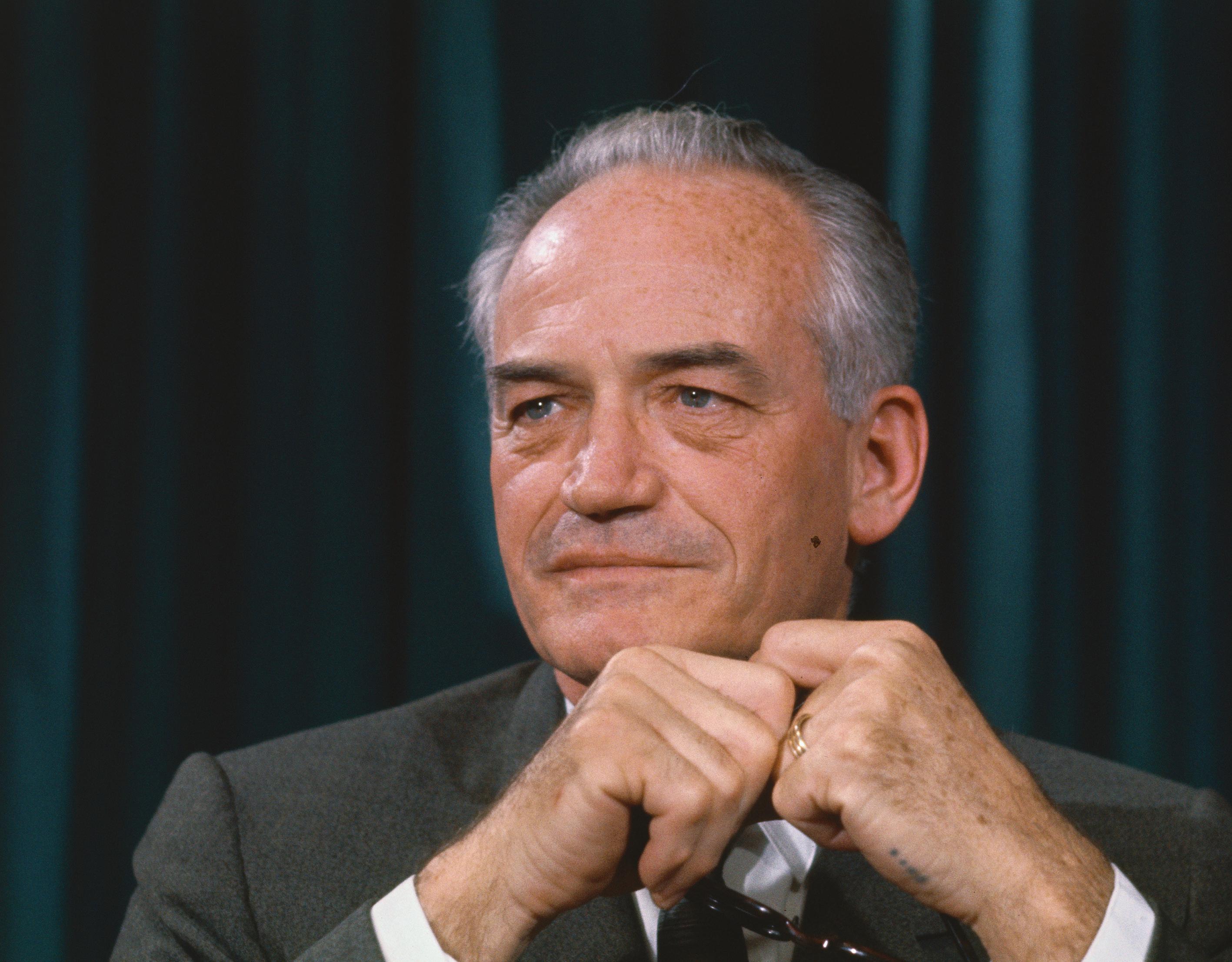
After Sen. Goldwater’s presidential defeat, Rand wrote: “The road is now left cleared for those who know that the battle has to be fought on moral-intellectual grounds, those who are willing to start from scratch and to build the philosophical foundation which freedom and capitalism had never possessed—those who are not afraid to be a minority.” (Bettmann via Getty Images)
In previous elections, the issue was evaded and left unnamed. This time, it was named. Just that. It was named and left hanging in a foggy vacuum (with both sides paying lip-service to free enterprise, and President Johnson mentioning it more often than did Sen. Goldwater). Whether one interprets the results as a measure of the country’s ideological corruption or as a measure of
the country’s political ignorance, the fact remains that it is welfare statism (and cynical, mixed-economy Pragmatism) that the country has endorsed. And if the statists now wish to claim that they have received a popular mandate, one cannot disprove it.
This is an example of why a half-battle is worse than none.
Those under 35 are coming to the cause of freedom, not by “tradition,” but by philosophical conviction.
Those who forget this lesson and start plunging into the “mainstream” or “dead center,” seeking a compromise with the worst and morally guiltiest group in the country: the “moderate” Republicans— deserve what they will get.
In the March issue of this Newsletter, I said: “An election campaign is not the cause, but the effect and the product of a culture’s intellectual trends. It is, perhaps, too early to fight for capitalism on the level of practical politics, in a culture devoid of any intellectual base for capitalism.”
What the election has taught me is to remove the “perhaps” from the above sentence.
One may vote, in future elections, for the lesser of two evils, when and if such a choice is offered. But—barring
some national catastrophe, such as an economic collapse—one cannot count on an election to reverse the trend toward statism, not for a long time to come.
Yet, bitter as things might seem at the moment, there are certain advantages for the advocates of freedom in the years ahead.
The chief advantage is a cleaner road.
One of the pre-election surveys claimed that the largest percentage of support for President Johnson was to be found in the age group of 35 to 49. Although statistical claims cannot be taken as conclusive proof, this one suggests some significant implications.
The majority of those over 49 are the real “conservatives,” in the true sense of that word; they are the men who,
reared before World War I, took capitalism smugly for granted and, refusing to take notice of its cracking ideological foundations, maintaining an attitude of stubbornly stagnant anti-intellectuality, tried to stem a philosophical flood by means of a few stale slogans—and let freedom slip through their limp fingers. Those between 35 and 49 are the product of the New Deal era, riding a dead intellectual horse. Those under 35 are coming to the cause of freedom, not by “tradition,” but by philosophical conviction.
What this election has wiped out are the old-guard, rearguard “conservatives” of the CoolidgeHoover-Taft axis, who wanted to go back, not to capitalism, but to the mixed economy of the 19th century, never asking themselves why it
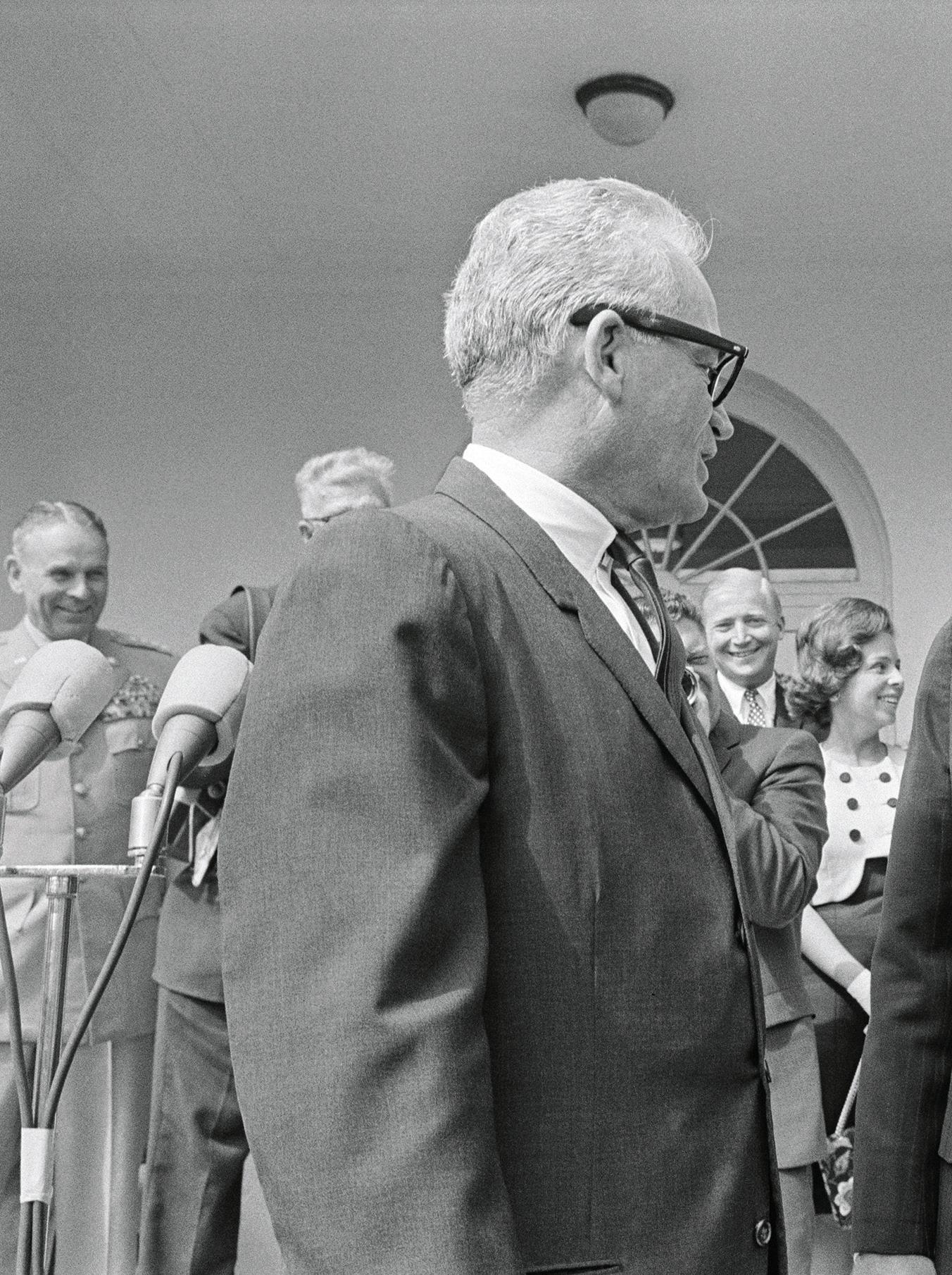
vanished in the first place, never admitting that they, not the “liberals,” started the trend toward government controls, which the “liberals” quite logically took over. The election has wiped out the pretensions of the countless so-called “patriotic” groups, organizations and publications that had never upheld capitalism,

The job to be done belongs to professional intellectuals. The battle has to be fought—and won—in colleges and universities, before it can be carried to the voting booths.
but thought it sufficient to be antisocialist and rely on “tradition.” The election has wiped out the illusions of those who believed that capitalism is compatible with altruism, and, dreading the necessity to challenge altruism, thought that capitalism could be purchased at a bargain price.
The political philosophy of America’s Founding Fathers is so thoroughly buried under decades of statist misrepresentations on one side and empty lip-service on the other, that it has to be re-discovered, not ritualistically repeated. It has to be rescued from the shameful barnacles of platitudes now hiding it. It has to be expanded—because

it was only a magnificent beginning, not a completed job, it was only a political philosophy without a full philosophical and moral foundation, which the “conservatives” cannot provide.
The road is now left cleared for those who know that the battle has to be fought on moral-intellectual grounds, those who are willing to start from scratch and to build the philosophical
foundation which freedom and capitalism had never possessed—those who are not afraid to be a minority.
This is no time for social metaphysicians, band-wagon-climbers, camp-followers, mystics, “traditionalists” or any of the shaky amateurs who believed that “conservatism” is safe, easy or fashionable, and were willing to collaborate with any dubious group so

So long as men are free to speak, a small, rational minority will always prevail over an irrational majority.
long as it was “anti-socialist.” This is no time for the “antis”—it is a time only for the “pros” in both meanings of the term. The job to be done belongs to professional intellectuals. The battle has to be fought—and won—in colleges and universities, before it can be carried to the voting booths. Not until a cultural movement is ready to answer such questions as those listed
by James Reston, can the advocates of freedom hope to be heard or understood at the polls.
It is too late for the “conservatives.” There is nothing left to “conserve.” It was too late for them in the election of 1932. It was much later than they thought. But for us—for the radical advocates of capitalism—it is merely the beginning.
In that same column of July 22, James Reston, the voice of “liberalism,” wrote: “In almost every great transformation in the lives of nations, it has usually been a small, ardent minority that has prevailed over the indifferent majority.” I would add a postscript to his statement: So long as men are free to speak, a small, rational minority will always prevail over an irrational majority.
Do not expect it to be easy. It will be a long battle. It is earlier than you think.



In 2023, ARI obtained special permission to reprint online the contents of four insightful scholarly books on Ayn Rand’s novels. By now, dozens of chapters from these books have been republished in New Ideal, making them available for the first time, free of charge, to a worldwide audience that includes intellectually ambitious young people, enrollees in ARU, and Rand fans everywhere. The chapter republished here, from Essays on Ayn Rand’s “The Fountainhead,” examines the personal meaning of Rand’s first bestseller in the life of her foremost student, Leonard Peikoff. (The chapter is based on a 2005 interview he gave to philosophy professor and ARI board member Robert Mayhew, editor of all four books. Dr. Peikoff read the transcript, which Dr. Mayhew edited, but noted that he had not read all of the other essays in the book, so inclusion of his interview should not be taken to imply approval of any other contributions.) The editors of Ayn Rand Today are pleased to offer this chapter in three installments: Part 1 appeared in our Spring Issue, Part 2 appeared in our Fall Issue, and Part 3 is included in this issue. We are grateful to ARI donors for supporting the licensing of these four books. If you’d like to read parts one and two, you can request copies of the Spring and Fall issues of Ayn Rand Today by emailing donorservices@aynrand.org.
Why does Roark say that the man who seeks power is the worst second-hander?
Ayn answers that in the book. She says that the other second-handers, such as Peter Keating, want to submit or live through others, at least for what they can get for themselves, like money, fame, etc. They have to sacrifice their soul and minds to do it, so that the things they get are no source of value or pleasure to them; but nevertheless, to that extent they are concerned with desires of their own. Whereas the man who seeks power, she explains in the novel, is living entirely through and for others—Toohey says this in his speech—for what he can do to others. His whole life is in others and how he can affect them. He doesn’t care about money, he doesn’t even care about titles, he doesn’t care if he’s poor and anonymous. What he wants is only the ability to shape the lives of others. So he is selfless in the most profound and all-inclusive way.
Isn’t Toohey a much worse second-hander than Wynand?
Of course, because Wynand does hold ideals, however perversely he acted on them. Toohey does not. Now,
you could say that Wynand is worse precisely because he has values, and then betrayed them by going after power. But Wynand does not really understand the nature of power lust, and would not have chosen it if he had, as Toohey explains to him: “So you were after power, Mr. Wynand? . . . You poor amateur! You never discovered the nature of your own ambition or you’d have known that you weren’t fit for it.” Toohey is incomparably worse.
Here’s another question on Wynand: Ayn Rand once described Wynand’s feelings for Roark as romantic love, an expression she usually reserved for a certain relationship between a man and a woman. What did she mean by this?
Ayn distinguishes three types of relationships—friendship, love, and sexual love—and we’re speaking now in the context of your question relating to two men. In the case of friendship, the other person is a value—perhaps even a great value, but is not irreplaceable in your life. If something were to happen to them, or they moved to Brazil, you would miss them and want to talk to them, etc., but


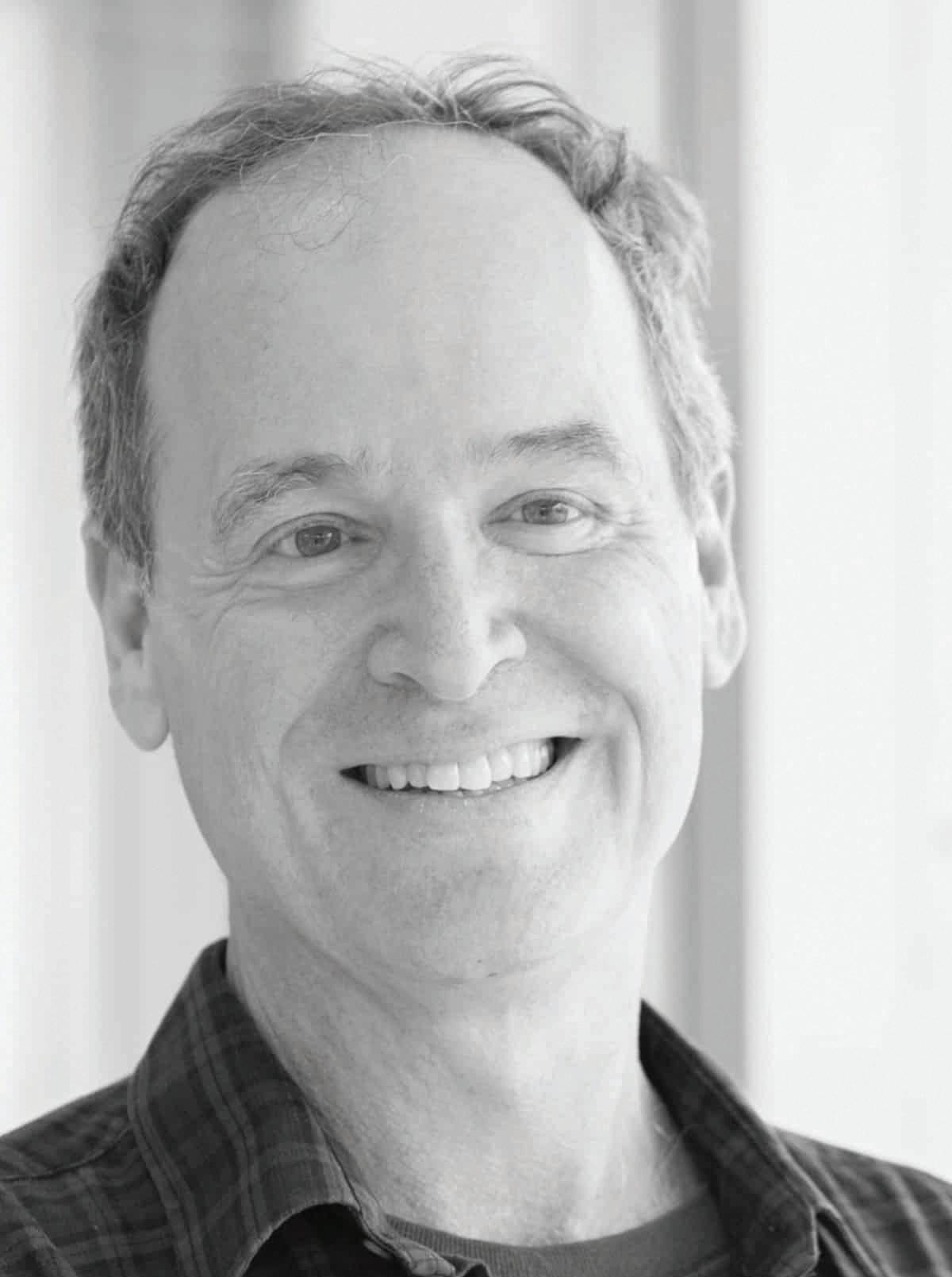
you could go on with your life ultimately just as happily, and make another friend, with whom you were also extremely close. This is not to say you would forget the lost friend, but he wouldn’t be an ongoing reality in your life.
Her definition of “love” is what you feel for the irreplaceable: the person loved is of such personal value to you that if lost, you could never again find someone of that value. You could never get your life back to the way it
was. You could go ahead with your life, work creatively, meet other people, but there would always be a void and an ache in your person, because you so valued the uniqueness of this person, the combination of qualities that no one else has. That is what she calls love. This relationship, she holds, can exist between two men who are both healthy; it would not include sex—because, she thought, they won’t have the desire for that form of expression of their love. But such love

can include admiration of the other’s body, and that’s why she included Roark standing naked on the deck of the yacht and Wynand commenting that Roark’s body should have been the model for the statue, not Dominique’s.
Finally, there is sexual love, between a man and a woman, in which the same irreplaceability exists, but with the additional and crucial form of expression of the sexual relationship.
Let’s turn briefly from the novel to the film version of The Fountainhead: What is your opinion of it, and did you ever discuss it with Ayn Rand?
I would say the film is okay, about 7 or so out of 10. The script was excellent— Ayn wrote it. But there were other aspects that left something to be desired. It was not Romantic enough
in style; in fact, Ayn’s major objection was that the direction was Naturalistic and clashed with the novel. She also thought Gary Cooper’s acting was pretty shaky. She told me that she had been on the set throughout the filming, and she had tried to help him, repeatedly going over Roark’s speech with him, and he sort of got its meaning in the end, but not entirely. According to Ayn, after he saw the final cut, he said to her: “Now I understand how I should have delivered it.” Gary Cooper was a nice guy, but totally nonintellectual; he often played Westerns, for instance, and it was difficult for him to give a philosophical speech preaching unconventional ideas. He deserves a lot of credit, though, because I understand he was under tremendous pressure from his agent and other associates not to do the movie—on the ground that its politics would harm him in Hollywood; but he was adamant. He liked the novel and was going to do this film, no matter what the consequences. That’s a rare phenomenon. Patricia Neal took the role of Dominique not out of courage, but because this was her entry into the big time—to star in a role like that with Gary Cooper (and, so it was said, have an affair with him at the same time). I thought she did very well—better than
Cooper. On the whole, though, I didn’t like the casting. Greta Garbo, I should add, was Ayn’s choice for the part: but Garbo flatly refused to appear with Cooper as her lover—he wasn’t her type, she explained.
Ayn was moderately pleased with the film, though she thought the Italian version of We the Living was much better than the Hollywood version of The Fountainhead. It was more faithful to the book, and Alida Valli, she held, was perfect for the role of Kira. (She didn’t like Rossano Brazzi that much as Leo.)
One last set of questions: What did The Fountainhead mean to you when you first read it and continued to re-read it? What does it mean to you now?
What I get from The Fountainhead is the experience of a universe in which I want always to live: a world of ideas, passion, values, drama, creativity—of people of stature, brilliance, achievement. It is the exact opposite of the world I grew up in—a small town with ordinary people who were uninterested in ideas, and would dismiss philosophical questions with the comment: “Nobody knows, and what’s the difference?” There is no

Peikoff met Ayn Rand in 1951 at age 17. The encounter changed his life. Peikoff said, “Reading The Fountainhead always took me out of the routine—even after being an Objectivist for decades—and brought me back to my beginning and to what is still possible. I kept at it until I got to know it too well.” (© Leonard Peikoff [Ayn Rand Archives])
aspect of Winnipeg that I could consider heroic, with the possible exception of the fact that people regularly went out in –35 degree weather. Reading The Fountainhead was like going to another planet. That’s why I kept steeping myself in it. Now, once I was in New York and seeing Ayn regularly, I didn’t need The Fountainhead as much, because Ayn in person radiated the same universe. But the book could still bring back my youth and what it meant to me, and the astonishment of finding out what was possible in life. Reading The Fountainhead always took me out of the routine—even after being an Objectivist for decades— and brought me back to my beginning and to what is still possible. I kept at it until I got to know it too well.
You continued reading The Fountainhead regularly after the publication of Atlas Shrugged?
Are you kidding? I continued reading it as long as I felt the need, and I felt it often. I have a much more personal relationship to The Fountainhead than I ever did to Atlas Shrugged. I love and admire Atlas. There’s no question it’s the greatest book Ayn wrote. But The Fountainhead was to me the opening up of reality. It was what hit me as a person, intellectually and emotionally, and changed my life. It was what made it possible for me to understand Atlas; The Fountainhead was always my ideal, my idealism, and my personal guide— and it has never lost that status.
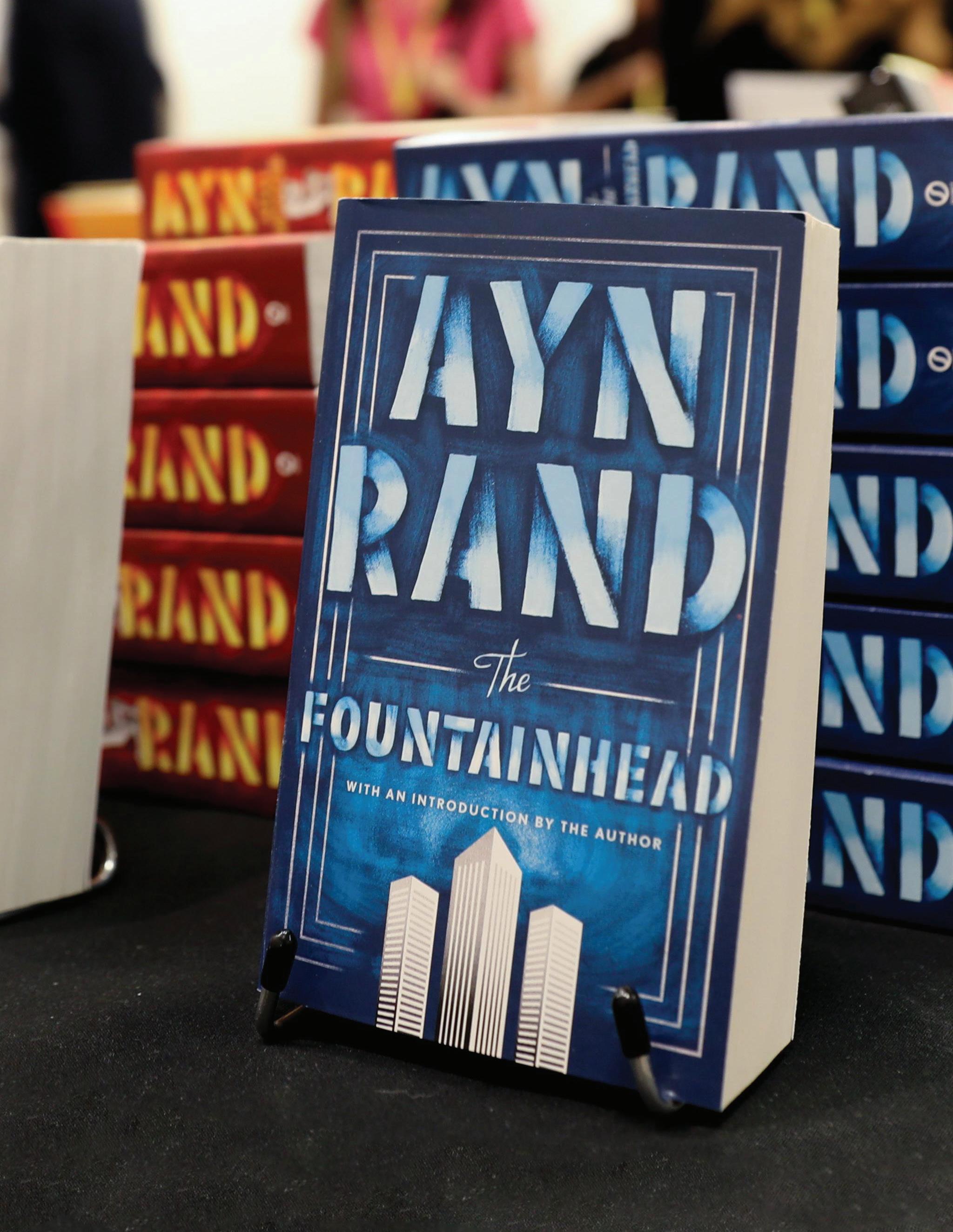


Between 1959 and 1961, Ayn Rand sat down for in-depth television interviews with the prominent broadcast journalist Mike Wallace. In 2024, the Ayn Rand Institute published the second of these four historic conversations, a piece of audio that has never been publicly available online. In the 64 years since this fascinating interview was first broadcast on May 4, 1960, it has rarely (if ever) been heard beyond the confines of an archival repository.
Bringing this content to a global audience was no easy task. Although a degraded recording existed in the Ayn Rand Archives, it was barely intelligible and not suitable for public consumption. We set out to track down a better version.
Fortunately, we discovered a high-quality digital recording in the University of Syracuse Archives, the home of the Mike Wallace Papers. ARI then acquired permission to publish the audio from the copyright holder, the Bentley Historical Library at the University of Michigan.

For the first time in over half a century, the broader public is now able to hear Rand’s powerful and inspiring message at a time when it is desperately needed. During the interview, Rand commented on a range of issues, including the proper relationship between reason and emotion, as well as an assessment of America’s leadership at the height of the Cold War. Rand drew a connection between the country’s failed foreign policy and the conventional morality,
offering a grim prognostication of America’s future. This prompted Wallace to exclaim that she must be “an awful pessimist,” a charge that Rand forcefully denied. She replied: “Oh, not at all. Ideas brought us here and ideas can take us out. I am the opposite of a pessimist. Why do you think I come out and defy 2,000 years or more of civilization? Because I know that if the right is on my side, if reason is on my side, I will win. The right ideas have always won.”

For the first time in over half a century, the broader public is now able to hear Rand’s powerful and inspiring message at a time when it is desperately needed.
Given that Rand’s first interview with Mike Wallace has been viewed (as of this writing) more than two million times on the Ayn Rand Institute’s YouTube channel, it is clear that this interview series resonates in a particularly meaningful way with fans around the world.
But more work is required to ensure that Rand’s prediction comes true and that “the right ideas win.” To that end, we’re committed to bringing online
more recordings of Rand’s public appearances. The Wallace interview is just one recording of Ayn Rand, who spoke to countless audiences on radio, television, and university campuses across America for a quarter of a century. To preserve and publish hundreds of hours of content waiting to be heard requires a significantly broader effort. It requires seeking out this new material in hundreds of archives and digital repositories, as well as acquiring copyright clearances from the intellectual property holders.
These are challenges that the Ayn Rand Institute would be unable to undertake without the generous financial support of our donors, whose support helps make Rand more publicly accessible than she’s ever been. For those who would like to see more of Ayn Rand’s on-air legacy made public, consider increasing your support to the Ayn Rand Institute, so that we can continue to make these efforts possible.


“I see the Conceptual Education Program as a save-the-world endeavor.”
— Ed Thompson

At the Ayn Rand Institute we understand the importance of education. As Ayn Rand wrote:
The only purpose of education is to teach a student how to live his life—by developing his mind and equipping him to deal with reality. The training he needs is theoretical, i.e., conceptual. He has to be taught to think, to understand, to integrate, to prove. He has to be taught the essentials of the knowledge discovered in the past—and he has to be equipped to acquire further knowledge by his own effort.
Today’s educational system has defaulted on this vital task. It needs reform—reform shaped by a philosophy that empowers human beings to think and to live. The purpose of ARI’s Conceptual Education Program (CEP) is to advance that reform.
This program was founded by ARI supporter Mr. Ed Thompson. “I am passionate about reforming the educational system,” Mr. Thompson told us, “because I understand clearly that it is fully responsible for creating our national disaster. The Conceptual Education Program is my way of galvanizing support for educational reform. I see the Conceptual Education Program as a save-the-world endeavor.”
Through CEP, ARI is able to undertake meaningful steps in our advocacy for educational reform. Educational reform, Mr. Thompson argues, is the “one in the many.” Improving education improves every other area of human life. To achieve that goal, CEP trains new intellectuals who can articulate

and advocate a rational approach to education, producing articles, talks, conference presentations, and other educational content on the philosophy of education.
CEP supports Sam Weaver, a Conceptual Education fellow. Sam told us: “Ayn Rand’s philosophy, especially


her epistemology, provides a wealth of unique insights to help us understand the destructive nature of the educational establishment and articulate a rational approach. Promoting educational reform based on her ideas is a crucial means of improving the lives of students and changing the culture for the better.”
You can watch Sam’s content on YouTube (aynrand.org/sam/youtube) or read his articles on New Ideal (aynrand.org/ sam/newideal) and share his work to promote cultural impact. You can also contribute to the Conceptual Education Program directly online at aynrand.org/ donate-cep or by noting “CEP” on your donation check.


Atlantis Legacy is ARI’s program for recognizing donors who have included the Institute in their estate plans and have informed us that they have done so. These special donors provide us with the vital fuel for our mission, including educating the next generation of professional Objectivist intellectuals who will go on to spread Ayn Rand’s ideas in the culture. Atlantis Legacy members value the Ayn Rand Institute’s commitment to Ayn Rand’s ideals and its strategy for advancing her philosophy. It is thanks to their generous planned gifts that ARI can pursue our ambitious long-term mission.
To show our gratitude, we will be offering Atlantis Legacy members special recognition within our new Ayn Rand Center building in Austin, Texas, projected for completion in 2028.
This fall, Kathy Cross, creator of the Atlantis Legacy program, retired from the Institute after a long and rewarding career building the program and securing legacy commitments that will help propel ARI into this new chapter. She writes:
It has been a great honor for me to work at the Institute since its early years, and to assist donors in navigating their Atlantis Legacy gift options for maximum efficacy and impact—for them and for ARI. It was especially satisfying to work with donors whose philosophical values aligned with my own. I encountered so many who were, and are (to paraphrase Ayn Rand), fighting for the future and living in that future today. The new Ayn Rand Center is an exciting opportunity for these remarkable individuals to be recognized as proud supporters of Ayn Rand’s vision of Atlantis and of her world-changing ideas.
The Atlantis Legacy program is easy to join and is open to all ages at any gift amount.
To join the program and learn about the special tax advantages available, please contact Anna Steinberg, ARI’s director of Gift Planning, at (800) 365-6552 or email atlantislegacy@aynrand.org.

ARI’s core strategy for advancing Objectivism is our in-depth education program, ARU. How do we attract students to ARU? One of our most important tools is our AynRandCon conferences, weekend-long events for students new to Objectivism.
AynRandCons bring together students from around the globe to meet, study, and learn from speakers such as Onkar Ghate, Nikos Sotirakopoulos, and Yaron Brook. By getting to know these students in-person, we’re able to spot intelligent young minds passionate about Ayn Rand’s ideas and encourage them to study with us at ARU. This is often our first live interaction with the students who will be the Objectivist thought leaders of tomorrow.
This year, we attracted nearly 200 attendees between our Austin, Texas, event and our Amsterdam event in Europe. According to one attendee: “For me it was a great opportunity to meet other people who share my interest in Objectivism. Meeting people of all ages and seeing how they implement the ideas in their lives was valuable and assuring. The lectures were well thought out and extensive and there was ample space for Q&A and time to talk to other attendees and share your thoughts and ideas. . . . A great weekend.”
It is because we have received such enthusiastic responses from attendees that we have decided to expand further! We held our first-ever AynRandCon event in Australia, December 6–8, 2024, and we’ll be returning to the US and Europe in 2025. If you would like to join us or help sponsor a student, please visit aynrand.org/austin or aynrand.org/berlin.












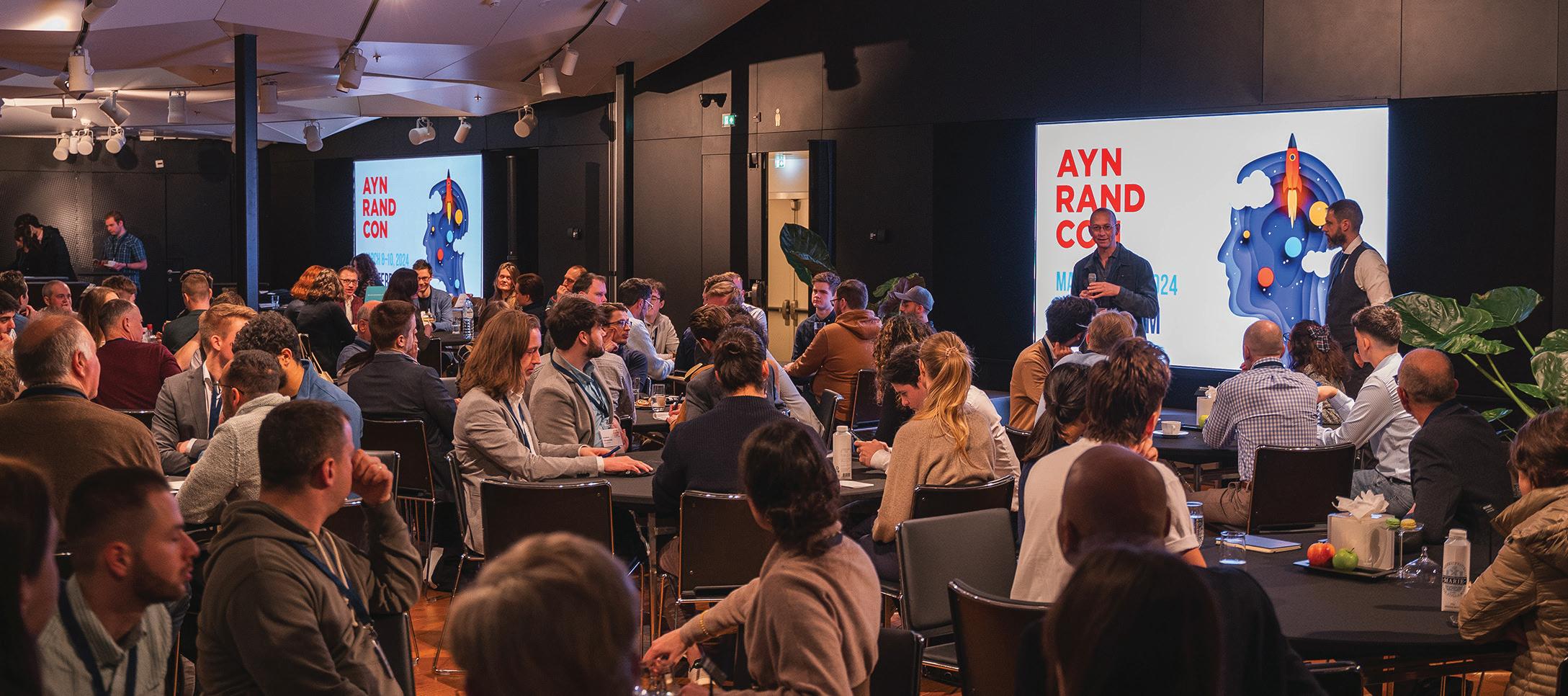
OCON 2024 inspired attendees in Anaheim, California, with a stimulating blend of engaging intellectual content, fun social events, and the warm spirit of community. As one attendee raved: “This year’s OCON was one of the most amazing weeks of my life—maybe the most amazing week. Just in terms of the setting and the ability to talk to a great number of amazing people was a privilege and a joy to me. . . . I’m not confident I could gather the words to describe how much the conference has meant to me.” —Benjamin Nunes Mões
Thank you to everyone who joined us—virtually and in person— for an incredible lineup of speakers, illuminating keynote lectures, sample classes, and social events. From our popular West Coast Swing dance class to our archivist-led Love Letters screening, delving into the film’s fascinating history, to ARI’s very special Gala honoring Harry Binswanger, it was a truly unforgettable week.
2025 marks the 40th anniversary of ARI’s founding and we’ll commemorate the occasion at OCON, July 1–5 in Boston. We’re putting together a great lineup of talks and events, including excursions and Archives tours. Don’t miss this opportunity to celebrate with us!
To register for next year’s conference, visit ocon.aynrand.org.

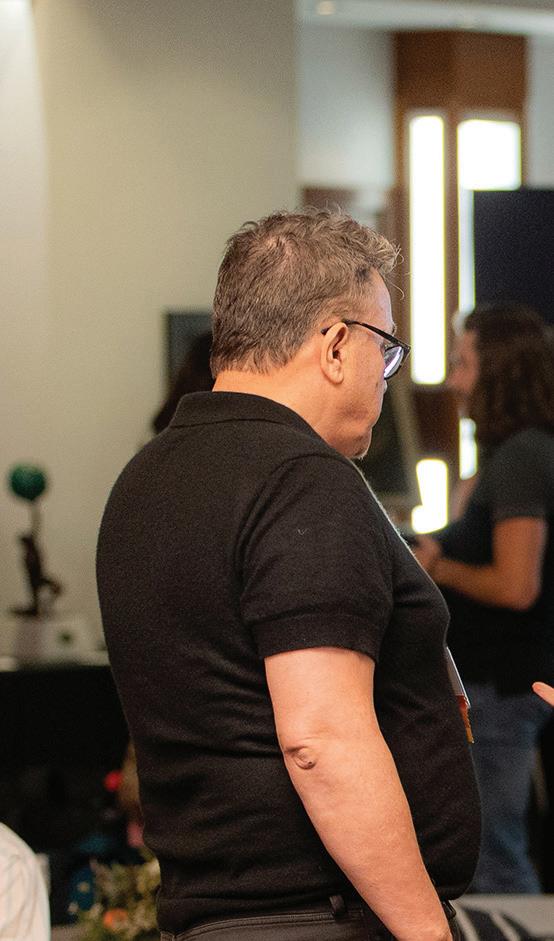




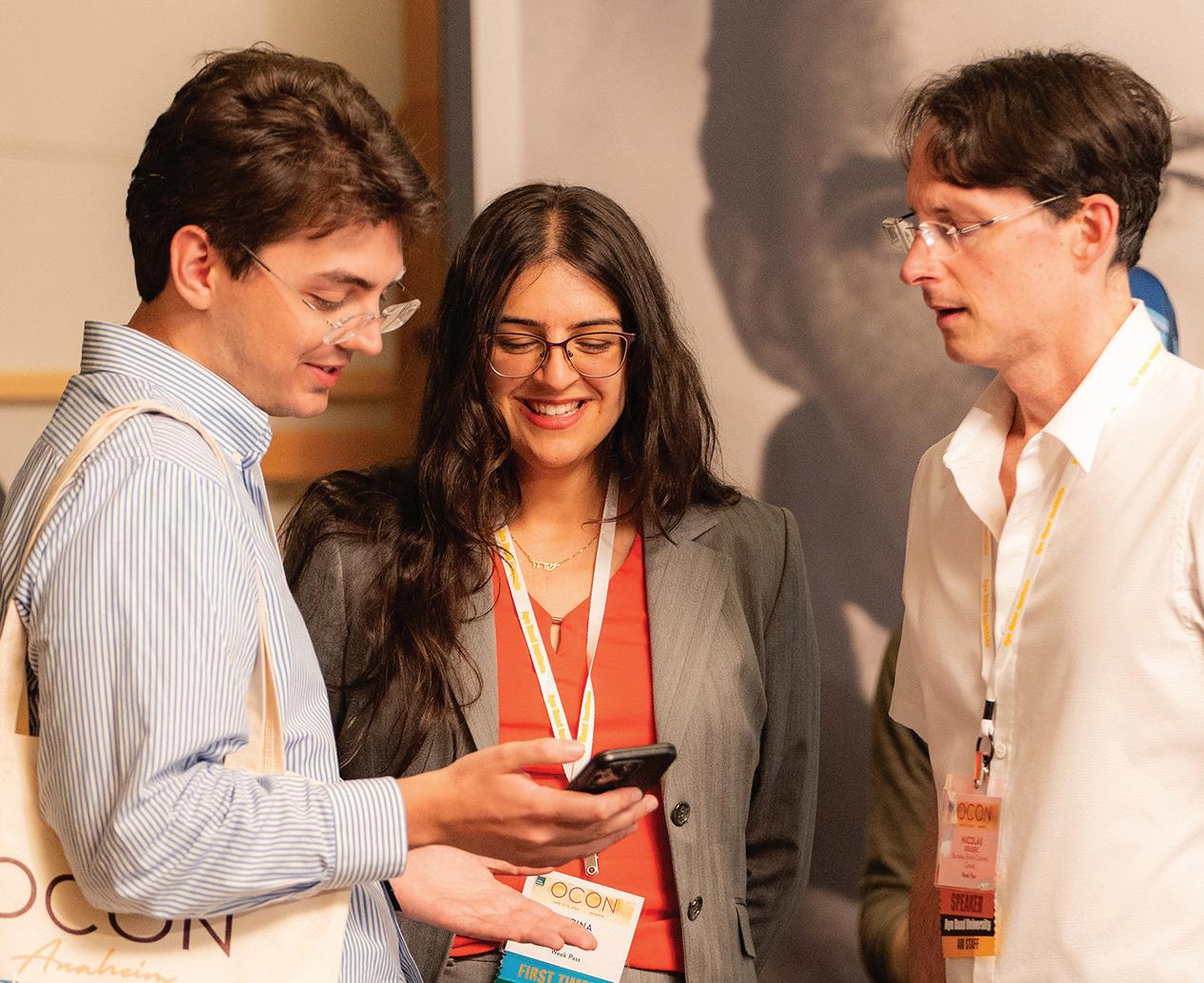



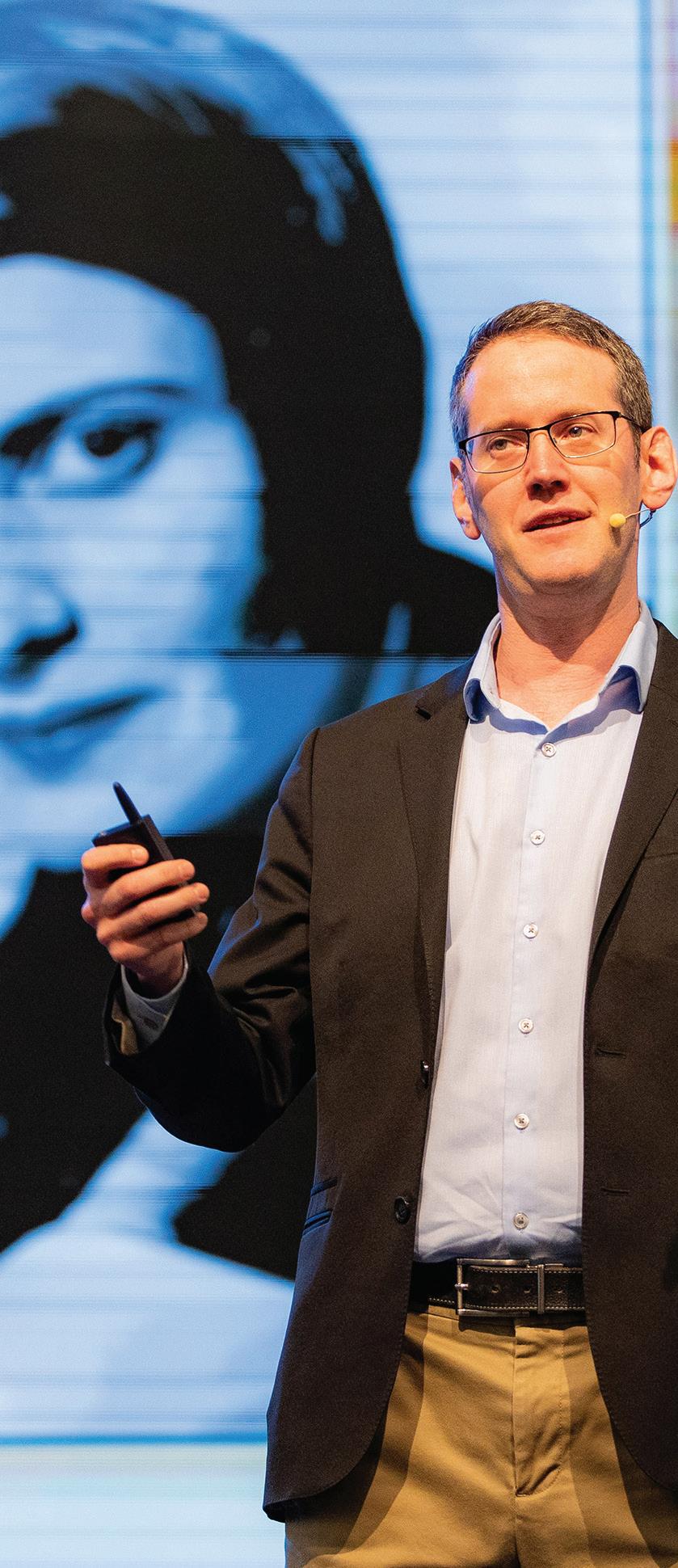


The work we do at ARI wouldn’t be possible without our amazing team of ARI staff members. We reached out to some of them and asked what it means to them to work at ARI—and we got some inspiring answers.


Senior Director of Growth and Technology
When I found Ayn Rand back in college, I realized she was deeply right about the world. Atlas Shrugged revealed the causes of many problems I saw and “For the New Intellectual” convinced me that a generation of productive thinkers could be the solution. Now, a decade later, I get to use my skills in building and marketing products to help create that wave of new intellectuals. My team identifies opportunities to reach people with potential, and then we build campaigns or products that teach them Objectivism. If “For the New Intellectual” is a strategic blueprint, we’re the team building the machine.
Visiting Fellow
I love interacting with students in ARU: answering their questions, discussing topics that are of importance to them, and seeing their intellectual growth from one class to another. It is rare and exciting for an educator to work with students who have such a high degree of curiosity, sincerity and active-minded engagement with important ideas. It is even more rare to work in an educational program that encourages students to think about major philosophical and cultural issues with clarity and precision, as the Ayn Rand Institute does.



Events Specialist
It’s been wonderful working for an organization that promotes the philosophy I live my life by, and working with people who feel the same way. As ARI’s events specialist, I understand that events are an important aspect of how we reach our community, and a way people in the movement— or fans of Ayn Rand—can experience first-hand the kind of world we’re trying to make. In ARI’s mission of spreading Objectivism around the world, giving people a chance to meet like-minded people and see the philosophy in action is an important element.
ARU Sales Project Manager and Marketing Coordinator
Working for ARI means I get to work with individuals who value their time and mine. They take seriously what they do and want their work to be the best it can be. It’s easy to want to contribute to a team like that! My position with the Marketing and Sales teams helps move our most important numbers forward by tracking and reminding everyone of the small steps needed to be taken in order for us to reach larger, big-picture goals.
Vice President of Fundraising and Marketing
Working at ARI is like getting to help build Atlantis. The Institute takes Ayn Rand’s ideas and ideals seriously—and it relentlessly pursues a strategy for making Rand’s vision the guiding philosophy of our culture. Nothing makes me happier than the fact that I get to wake up every day and work with amazing people committed to making Objectivism a cultural force.
Tyler Ashby Content Marketing Coordinator
David Bakker ARU Teaching Assistant
Robertas Bakula ARU GC Associate
Kirk Barbera Development Account Manager
Ben Bayer Director of Content and Fellow
Jonathon Brajdic Growth Product Manager
Jeff Britting Physical and Analog Archivist
Amber Brown Development Marketing Manager
Brayton Bushby Development Account Manager
Marcos Carbonell Software Engineer
Kathy Cross Senior Legacy Giving Manager
Yonatan Daon Outreach Coordinator
Tristan de Liège Post Doctoral Fellow
Jonathan Divin Online Community Specialist
Simon Federman Archives Coordinator
Itamar Feldman ARU Honors Work -Study Intern
Vinny Freire IT and Engineering Manager
Aaron Fried Senior Director of Growth and Technology
Onkar Ghate Chief Philosophy Officer and Senior Fellow
Ziemowit Gowin Junior Fellow
David Gulbraa Donor Services Specialist
Audra Hilse Digital Archivist
Jeff Janicke Business Operations and IT Coordinator
Elan Journo Vice President of Content and Senior Fellow
Elizabeth Judge Senior Project Manager, Marketing
Nicolas Krusek Visiting Fellow
Dagny Layman Development Specialist
Brandon Lisi Associate Archivist and Researcher
Keith Lockitch Vice President of Education and Senior Fellow
Stewart Margolis Development Account Manager
Amanda Maxham ARU Mentorship Strategist and Special Projects Manager
Mike Mazza Associate Fellow
Maria McRaven Business Process Manager
Isiah Merritt-Slade ARU Honors Work-Study Intern
Shruti Menon ARU Student Relations Assistant
Marek Michulka ARU Honors Work-Study Intern
Donna Montrezza Copy Editor
Matthew Morgen Director of Donor Relations
Hailey O’Brien Events Specialist
Grant Parker Product Operations Specialist
Ricardo Pinto Junior Fellow
Jason Rheins Fellow and Instructor
Ilia Rusin ARU Coordinator
Romy Salgado Sr. Accountant/HR Specialist
Steven Schub Student Success Manager
Ray Schuur Junior Fellow
Dan Schwartz Visiting Fellow
Jeff Scialabba Director of ARU Operations
Kate Sherwood ARU Sales Project Manager and Marketing Coordinator
Carla Silk Chief Operating Officer
Sarah Silverman Content Project Senior Manager
Aaron Smith Instructor and Fellow
Nikos Sotirakopoulos Visiting Fellow
Anna Steinberg Director of Development
Clytze Sun Video Production Lead
Tal Tsfany President and Chief Executive Officer
Agustina Vergara Cid Associate Fellow
Don Watkins Vice President of Fundraising and Marketing
Sam Weaver Associate Fellow
Alex Wigger Content Production Specialist
Geraldine Yumping Controller
Yaron Brook
Chairman of the Board of Directors, former CEO of ARI, Co-Founder of BHZ Capital LLC and host of The Yaron Brook Show

John Allison
Executive-in-Residence at the Wake Forest University School of Business and retired Chairman and CEO of BB&T. Member of the Cato Institute’s Board of Directors.
Loren Corle
Retired entrepreneur. Founder and former CEO of RELCO LLC.
Onkar Ghate
Chief Philosophy Officer and Senior Fellow at ARI. He is the Institute’s resident expert on Objectivism.




Robert Mayhew
Professor of Philosophy at Seton Hall University
Larry Salzman
Vice President for Litigation, Policy and Research, Pacific Legal Foundation
Tara Smith
President and CEO of ARI
Professor of philosophy at University of Texas at Austin Tal Tsfany





STATEMENT OF FINANCIAL POSITION AS OF SEPTEMBER 30, 2024 (IN THOUSANDS)
$31,991 – Current Assets
$22,505 – Long-Term Assets
$54,496 – Total Assets
LIABILITIES & NET ASSETS
$956 – Current Liabilities
$1,323 – Long-Term Liabilities
$52,217 – Net Assets
$54,496 – Total Liabilities & Net Assets
Thanks to our generous donors, ARI is able to offer scholarships to exceptional ARU students. Studying at ARU is an unparalleled opportunity for students to surround themselves with a community of like-minded individuals and learn from the world’s best experts on Objectivism. We extend our gratitude to our supporters for helping us provide the next generation with the world’s best training in Rand’s ideas. Pictured here: The ARU 2024 graduating class.

STATEMENT OF ACTIVITIES AS OF SEPTEMBER 30, 2024 (IN THOUSANDS)
REVENUES
24% $8,582 – Contributions (Standard Giving) 7% $2,497 – Contributions (Atlantis Legacy Gifts)
2% $885 – Program Revenues

$11,964 – Total Contributions & Program Revenues 63% $22,688 – Earmarked Contributions (Capital Campaign) 24% $8,582 – Investment Returns and Other Revenues
$36,094 – Total Revenue
– Education Programs
– Outreach Programs
–
–
– Fundraising
– Management and General $10,511 – Total Expenses
– Change in Net Assets

Copyright © 1985 – 2025 The Ayn Rand Institute (ARI). Reproduction of content and images in whole or in part is prohibited. All rights reserved. ARI is a 501(c)(3) nonprofit organization. Contributions to ARI in the United States are tax-exempt to the extent provided by law. Objectivist Conferences (OCON), Ayn Rand Conference (AynRandCon), ARU and the Ayn Rand Institute eStore are operated by ARI. Payments to OCON, AynRandCon, ARU or the Ayn Rand Institute eStore do not qualify as tax-deductible contributions to the Ayn Rand Institute. AYN RAND, AYN RAND INSTITUTE, ARI and the AYN RAND device are trademarks of the Ayn Rand Institute. All rights reserved.
To the extent that efforts to trace copyright holders may have been unsuccessful, the publisher welcomes notification of existing rights and terms of use.